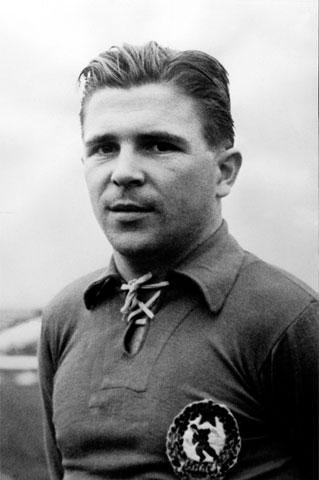In 1954, on the occasion of FIFA's 50th anniversary, FIFA chose Switzerland, the country where its headquarters are located in Zurich, as the host country for the 5th World Cup. Previous articleWe talked about how the famous "Maracanã Strike" dealt a heavy blow to the people and development of Brazil as a whole. In this World Cup, there was also a game in the final that affected the fate of the country, and the difference was that the impact was positive. And since the 1954 World Cup was first taken live on television. This influence has also been greatly diffused.
After the last strange schedule of forming a champion through a single round robin, this World Cup adopted a more reasonable knockout mechanism in the second half. The two countries that reached the World Cup finals were Hungary and the Federal Republic of Germany.
The Hungarian team in 1954 had what is known as the strongest golden generation in Europe, led by Puskas, the ancient god of the Imperial Horse. He and Di Stefano formed a Real Madrid striker that played all over Europe. At that time, Hungary won 30 consecutive unbeaten games before the final, and after the final, it was again unbeaten in 18 consecutive games. During this period, Hungary once defeated England, the originator of modern football, twice: 6-3 at Wembley Stadium and 7-1 at home. These two matches brought Hungary's prestige to the top, and it was recognized as the strongest team in the world.

The Federal Republic of Germany, on the other hand, was still immersed in the pain of defeat in World War II. Many of the team's players also enlisted in World War II. In order to ensure the safety of the national team's players, The German coach at the time, Herberg, tried every means to pull domestic football players back from the rear of the battlefield in the war: making sports movies for the Nazis required the use of real players to star, forging relevant medals to help players leave the front line... These players have survived under his protection to have a chance to participate in this World Cup.
In the group stage, Germany and Hungary met, and Germany lost 3-8. The match made the invincible Hungarian team despise the German team even more. Unexpectedly, however, the German team adopted the tactics of the Field Ji horse race: head coach Herberg sent as many as 8 substitutes in the game in order to hide his strength, and it is said that he instructed the team's defender to shovel Puskas in the back, causing Puskas to truce two games due to bone fractures.
The final was held at Bern's Vankedorf Stadium, and until before the match, Herberg claimed that the strength of the team was far from hungary and did not expect to win the championship. This low profile completely confused the Hungarian team, and after the opening, the German team sent 5 new faces to compete. However, Puskas, who came with injuries, still played the role of superstar, and by the 8th minute, he had already scored twice to help Hungary lead 2-0. Just when people thought Hungary had the right to win, the German team began to rely on tenacious will to fight back. It is said that before the day's match, Herberg predicted that if it rained that day and the stadium would become muddy and wet, then the Hungarian team with superior technology would not be able to play, and Germany would definitely win the championship. In the second half, it was really raining heavily over the pitch, and the venue became unusually muddy. Hungary's shot was constantly blocked by the goal frame or stopped rolling because the pitch was muddy, and another goal from Puskas was controversially awarded offside. In the 85th minute, a Shot from germany rolled irregularly on the muddy pitch and finally rolled into the gate. Germany won the World Cup.
This victory was called the "Bernese Miracle" by commentators at the time. The Bernese miracle brought great joy and inspiration to the German people after the war. Beckenbauer said that for the generation that grew up after World War II, the Bern miracle brought great happiness, the people regained their self-esteem, and the whole country recovered rapidly. The Germans even said that the Federal Republic of Germany should be renamed the "Bernese Republic".
The Bernese miracle shows how much football can incentivize the country. Encouraged by the 1954 World Cup, the German people came out of the humiliation and guilt of defeat, and the economy took off again, becoming a great power again.